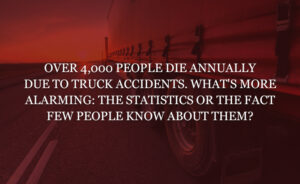
About 11 people a day – over 4,000 a year – die in truck accidents. An astounding 100,000 are injured in trucking crashes, according to statistics published by the Federal Motor Carrier Safety Administration.
These sobering stats may come as a surprise to you since national coverage on the issue is thin. Local press will cover crashes on a case-by-case basis, but little reporting is out there that connects the dots to show the magnitude of the problem that our country faces.
There’s more too. Amazingly, the most recent trucking statistics point to nearly an 18% increase in fatal trucking accidents. During the same time period, passenger car accident deaths were down nearly 2%, making this surge in trucking accidents all the more noteworthy.
It’s safe to assume that if another industry caused thousands of deaths a year, there would be a public outcry. A climb in fatality statistics would certainly cause understandable outrage by everyday people who don’t want to be the next victim.
Can you imagine if 4,000 Americans were killed every year on commercial jetliners? The public reaction and push for reform would arguably be considerable.

Keeping on Trucking to the Demand
The long and short of it is that the trucking industry is under strain to keep up with our ever-growing demand for goods. Already drivers are pushed to work long hours to meet tight deadlines. And the situation is only expected to become more competitive.
The American Trucking Associations (ATA) expects freight tonnage to rise 23.5% between now and 2025. Meeting that demand requires the industry to add nearly 100,000 drivers every year for the coming decade.
As it is, trucking companies face the constant battle of hanging onto good drivers. The work can be grueling, combining long hours behind the wheel with suppressed wages and considerable time away from family. All of this contributes to a high driver turnover rate, particularly among large trucking companies. The ATA put the annualized turnover rate for the third quarter of 2015 at 100% for large truckload carriers.
Are Federal Regulations Enough?
Let’s take a look at one recent incident that made headline news: the Tracy Morgan accident. As reported, the famous comedian barely survived the collision, while his friend James McNair sadly lost his life.
Walmart truck driver Kevin Roper rear-ended Morgan’s limo-van after being awake for 28 hours, 14 of which he was driving. Nonetheless, no evidence came to light showing that the driver broke federal regulations with regard to working hours or driving times.
Federal laws allow truck drivers to work up to 14 hours a day, with 11 of those hours in the driver’s seat.
Mr. Roper definitely broke law, going about 20 mph over the posted speed in a construction zone along the New Jersey Turnpike.
Culpability lays on Mr. Roper’s shoulders for driving so fast and not getting the rest he needed to perform his job satisfactorily. Still, it is fair to wonder how much those long working hours factored into the collision. It does raise the question of how far trucking safety regulations go to protect both drivers and the public.
Balancing Consumer Demand and Safety
There is little doubt that more needs to be done to ensure public safety on our roadways and to minimize the number of trucking collisions. Should the public be more outspoken in demanding this of the industry and of legislators? How do we balance common sense trucking industry safety measures with our evolving expectations for more and more goods?
We’d love to hear your thoughts in the comments below.
Fried Goldberg wishes you safe travels. If you or a loved one is a trucking accident victim, we are dedicated to being your biggest ally. We are a team of trucking accident attorneys with decades of practice and a proven track record of winning compensation for our clients.
